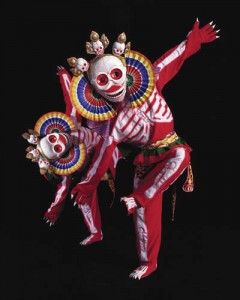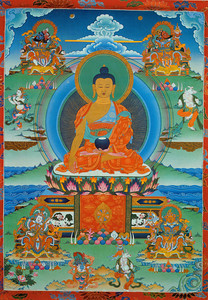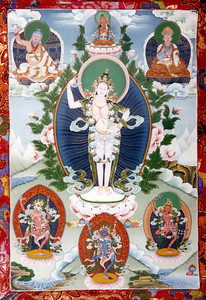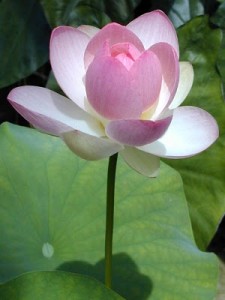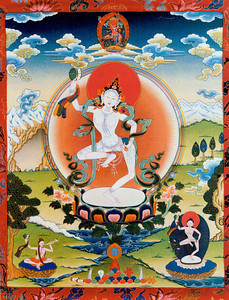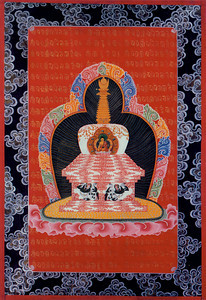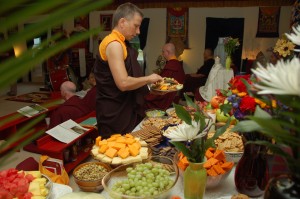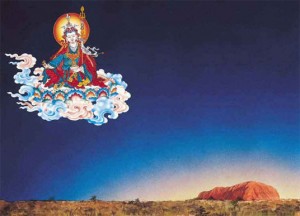
An excerpt from the Mindfulness workshop given by Jetsunma Ahkon Lhamo in 1999
One of the practices that we are taught as Buddhists is that always, always, Guru Rinpoche should be above the crown of our heads. We should be mindful that Guru Rinpoche is always there, seated on his lotus throne. Upon going to sleep, we should visualize that Guru Rinpoche becomes like light or liquid and then pours into the top chakra and through the central channel, and remains in the heart throughout the night. We fall asleep with Guru Rinpoche in the heart. This kind of mindfulness is the best part of practice. No matter what else I do, even if I don’t sit down and practice formally, I practice like that all the time. That’s the backbone that I rely on.
When I talk to any of my students, the way that I practice View is that, as a Lama, I consider that the students are higher than me. (You should never do that! But I can do that.) I consider that the students are higher than me because there are many of them and I am only one and our nature is the same. It’s a little bit like the posture of Jesus washing the feet of the disciples. There is an element of sacrifice, there is an element of viewing the propagation of Dharma and the display of Bodhicitta to be all there is, the highest. There is nothing else higher. So I practice in such a way that the students are higher. I hold them in high regard. They are more precious to me than the other stuff that I do. I hold the students much higher than I hold myself.
It is the student’s job to practice that discrimination constantly. One thing that we should do is consider that every event, every moment, every hour, every day, every breath has as its core nature Guru Rinpoche, the blessing of Guru Rinpoche, the appearance of Guru Rinpoche. How does one practice that? It is the kind of thing that you have to grow into. You can’t just think all of a sudden, “Well, I’m never going to think about anything else. I’m just going to think about Guru Rinpoche from now on, and therefore that’ll be real easy. He’ll just always be on my mind.” That would make you crazy, wouldn’t it? Trying to force that little monkey in a cage to do what you want? You don’t have to do it that way.
We start by creating habitual patterns that include body, speech and mind. We want to include these three elements. One way to practice this kind of mindfulness is to have an altar in your home. If you don’t have an altar in your bedroom, perhaps you can have a picture by your bedside of Guru Rinpoche or your Root Teacher, maybe both. That’s a good visualization. Then, when you first wake up in the morning, the first thing you do — even before you go to the bathroom, even before the coffee — the first thing you do is look at that picture and reorient yourself: that this day the Guru is above the crown of my head. This hour, this day, right now, the Guru is above the crown of my head and you make three prostrations. You have it in your mind that this day is therefore sacred and then you dedicate the sacredness of this day to the liberation and salvation of all sentient beings. No one can take that away from you no matter what happens during the day. If you get hit by a car and both your legs come off, they still can’t take that away from you. Even if you were to lose your life, the sacredness could not be taken away from you.
Any time you go into a specific event, whether it’s ordinary or whether it’s a spiritual event, hold the picture of Guru Rinpoche or the Root Guru in your mind, reestablish the picture above the top of your head, and know that this experience begins and ends with the Guru. If you’re going to the grocery store to buy food for your children or your family, this is an excellent thing to do. Gradually, over time, even in ordinary experiences that had no flavor, that seemed to have no connection between this ordinary activity and spirituality, you will begin to establish more of a View and begin to see every experience as spiritual. Whatever job you have, whatever activities you engage in, look for the Guru there. If you look, you’ll find him. If you don’t look, you’ll never find him.
With that kind of discrimination and Guru Yoga, I find that the amazing opportunities and blessings come through the most ordinary experiences. To the degree that I see all phenomena as the mandala of the Guru, and I hold to be in union with the Guru constantly, then ordinary people, like gas station attendants, will say things that will blow your head off. That has happened to me, where I’ve been in that frame of mind, looking for the Guru and constantly mindful, and then pull into a gas station, and the gas station attendant says something that just rocks your world. And it’s about something weird, like renunciation or karma or something like that, and you say to yourself, “I’m listening, OK!” That happens. That doesn’t make the gas station attendant your Guru. You see the difference, don’t you? But it does mean that you are beginning to discriminate that nature. You’re beginning to awaken to that nature. It’s just a little thread, but it’s something. It is the beginning of awakening to that.
Somehow we have to think of incorporating this distinction of what is extraordinary into our lives. It has to be an effort that we actually provide for and make substantial, that we actually create in our lives. This opportunity to practice like that will never simply come to you. You may simply meet your Guru, but that’s because you practiced in your last life. That’s because you practiced before, that’s because you earned it, but once you meet the Guru, once you are on the path, this practice of Guru Yoga becomes your responsibility. To the degree that you really address it in a very profound, deep and heartfelt way, to that degree, it will benefit and it will awaken the mind.
© Jetsunma Ahkön Lhamo

